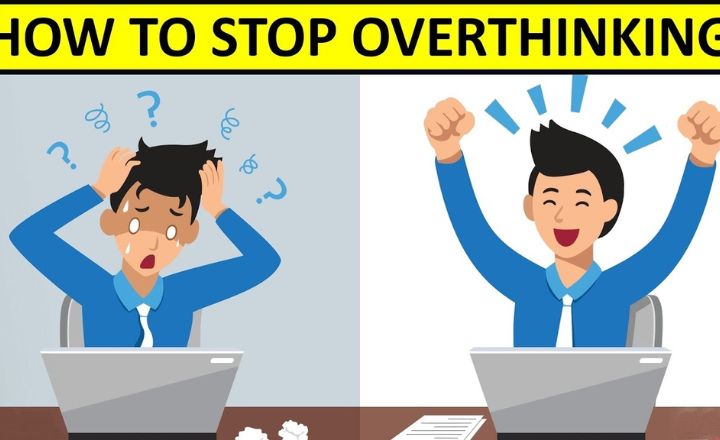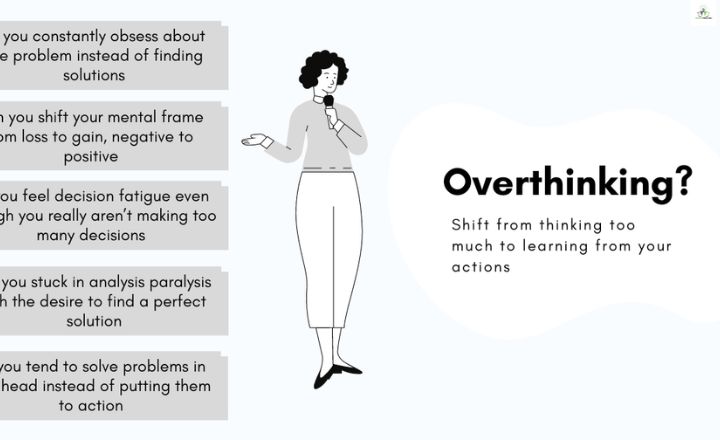Overthinking can feel like an uninvited guest in our mind, one that overstays its welcome and complicates even the simplest decisions. While a little reflection is healthy, excessive rumination can lead to anxiety, stress, and a paralyzing inability to take action
In this article, we’ll explore eight practical tips designed to help you stop overthinking and regain control over your thoughts. Whether you’re stuck in a loop about a recent mistake or fretting over what others might think of you, these easy-to-follow techniques will guide you toward clarity and peace of mind.
How to stop overthinking
Overthinking often feels like a never-ending loop where every thought cascades into another. To break this cycle, try to shift your focus from endless analysis to small, actionable steps. For instance, when you catch yourself spiraling into overthinking, pause and ask yourself what the next concrete action is in any situation. This approach not only grounds you but also transforms overwhelming thoughts into manageable tasks.
practicing mindfulness through deep breathing or short meditation sessions. When you center your thoughts on the present moment, it becomes easier to recognize that many of our worries are future projections rather than current realities.
journaling can be a compelling way to release pent-up thoughts; getting them onto paper allows for clarity and perspective shifts that can’t happen in your mind alone. The goal isn’t just to stop-overthinking but rather to redirect your mental energy towards creativity and productivity instead. Each step you take against overthinking brings more peace and confidence into your daily life.

What’s going on inside your head
Scientists don’t fully understand overthinking, but it likely involves the same brain areas linked to anxiety and fear. The cerebral cortex handles logical thinking and helps us remember and plan. However, if you fixate on something, like whether your sister is upset with you, the amygdala gets involved.
This part of the brain controls emotions and is tied to anxiety and fear. The amygdala makes our heart pound, says Pittman. It causes unease and muscle tension. She notes that the more you worry, the more you train your brain to focus on that worry, activating the amygdala further. This can create a harmful cycle and increase your risk of anxiety disorders later on.
She explains that worrying more makes your brain think about the problem more and activates the amygdala. This can create a cycle that may lead to anxiety disorders later on.
Tips to stop-overthinking

Trick your brain
Overthinking can trap you, pulling you away from what you should be doing. Carbonell explains that when you overthink, you become less active in your life.
However, you can break this cycle and take control again. Pittman offers a surprising tip: instead of trying to stop a thought, replace it with another one.
For example, if she tells you to stop thinking about pink elephants, you will likely think about them even more. Instead, think of something else, like a tortoise. Pittman suggests imagining a big tortoise holding a rose in its mouth. This way, you won’t think about pink elephants anymore.
Pittman also encourages her clients to set aside time to worry. She often says, Let’s schedule a time to worry from 4 to 5 p.m. This allows you to focus on your concerns later without letting them take over your day. When the scheduled time comes, you can make a plan to address your worries.
Having a plan will help you feel less tempted to return to those worries later.

Talk yourself out of it
Becoming self-aware can help you manage overthinking over time. Carbonell offers a strategy: Pay more attention. Say something like: I’m feeling anxious. Where am I? Am I just in my head? Maybe I should take a walk and see what happens.
You need to notice when your mind is racing and try to break that cycle. Do something in real life instead of just thinking, Carbonell advises.
In today’s chaotic world, it’s easy to stress about everything happening around us. But some problems are better left to others. Ask yourself if you really need to worry about a specific issue. For example, Is there going to be a nuclear attack?
Unless you work at the Pentagon, you don’t need to solve that, says Odessky. Remember, you won’t stop-overthinking overnight. With practice, you can train your mind to stay calm during stressful times.
This piece was created in partnership with Nike Training Club. To start your fitness journey, download the NTC app here.

Flip your perspectives
Stop-overthinking by changing your perspective. Focus on the best possible outcomes instead of the worst. When I start to overthink, I often imagine the worst things that could happen. As soon as I notice this, I change my viewpoint. Here are some ways to do that:
- Ask Reframing Questions
To change your perspective, ask yourself questions that help you see the situation differently. Try asking, What positive thing could happen? or What went well in that experience? or How else can I view this? These questions can really help shift your thinking.
- Look at the Big Picture
Overthinking makes us focus on small details that don’t really matter in the long run. Instead, take a step back and look at the bigger picture. Get out of the small details and see the overall situation.
Don’t talk it out to other overthinker
Talking with friends or family to solve a problem is okay. However, focusing too much on small details and negative aspects can make things worse.
It’s not helpful to share your worries with another overthinker or a negative person. Instead, talk to someone who can help you see things differently or more realistically. If you know someone like that, reach out to them when you feel overwhelmed. If not, think about seeing a therapist or life coach for support.
Keep yourself busy
Doing activities that use your physical and mental energy can help stop obsessive thinking. Go for a brisk walk, practice yoga, or hit the gym. You can also put together a puzzle or play a board game with a friend. If you can’t sleep at night because you’re overthinking, get up and read a book. Sleep is important, but if you can’t rest, do something that relaxes your mind.
Here are some great activities to help stop-overthinking:
- Paint or Draw
Being creative helps you focus and get out of your head. If you can’t draw or paint, that’s even better! It will take more of your attention to put pen or brush to paper.
- Exercise
Exercise keeps your mind busy and releases positive endorphins. You’ll feel better both physically and emotionally.
- Use a Coping Box
Create a self-care box filled with things you enjoy, like candies, fidget spinners, coloring books, and games. These items can keep you busy and bring you joy.

Understanding the reason
Stop-Overthinking by understanding the cause. Everyone overthinks sometimes, but if it happens a lot, it’s good to examine why.
Did something bad happen in your past? Have you experienced many negative events? These can lead to overthinking. By exploring the issue deeply, you can understand what’s really happening and address it. This can be tough to do alone, so consider talking to a therapist or counselor for support.
Let go of control
Letting go of control is tough, but it’s important to try. You can’t control everything, so don’t focus on it too much. Trying to control situations leads to frustration, anxiety, and fear. I often say, If it’s not meant to be, it’s not meant to be.
We may not understand everything that happens, but there’s a reason for it. Let go and let the Universe take care of it. Here are some tips to help you stop-overthinking and let go of control:
- Think About the Energy You Waste
Consider how much energy you waste trying to control everything. It can be emotionally draining to want things to go your way. Instead, redirect that energy to something more positive.
- Give Yourself a Break
Stop pressuring yourself to control everything. Show yourself kindness and understand that some situations are beyond your control. Focus on what you can do.
- Learn to Accept What Is
Accept that some things are out of your hands. Acceptance doesn’t mean you agree with it; it just means you recognize that you can’t change it.
Use stop word
Letting go of control is tough, but it’s important to try. You can’t control everything, so don’t focus on it too much. Trying to control situations leads to frustration, anxiety, and fear. I often say, If it’s not meant to be, it’s not meant to be.
We may not understand everything that happens, but there’s a reason for it. Let go and let the Universe take care of it. Here are some tips to help you stop overthinking and let go of control:
- Think About the Energy You Waste
Consider how much energy you waste trying to control everything. It can be emotionally draining to want things to go your way. Instead, redirect that energy to something more positive.
- Give Yourself a Break
Stop pressuring yourself to control everything. Show yourself kindness and understand that some situations are beyond your control. Focus on what you can do.
- Learn to Accept What Is
Accept that some things are out of your hands. Acceptance doesn’t mean you agree with it; it just means you recognize that you can’t change it.
conclusion
overcoming the habit of overthinking is essential for achieving mental clarity and emotional well-being.
By recognizing when our minds start to spiral into unnecessary worry, we can take proactive steps to redirect our thoughts toward more positive and productive pathways. Practicing mindfulness, setting time limits for decision-making, and focusing on actionable solutions can significantly reduce the burdens of over analysis.
Embracing simplicity in thought processes allows us to cultivate a more fulfilling and present life. So, let today be the day you choose to quiet your mind and take action instead of getting lost in endless contemplation.

